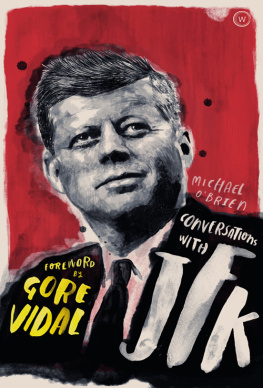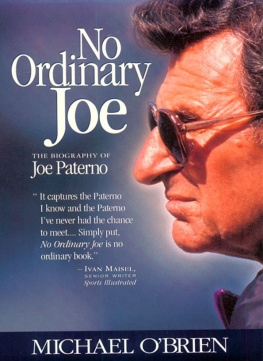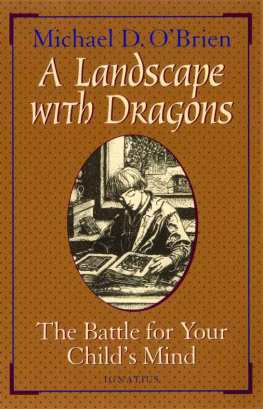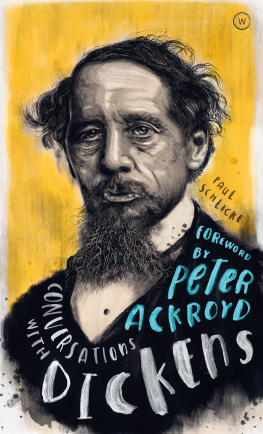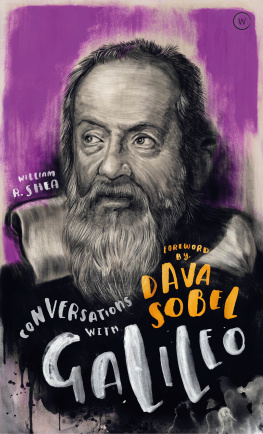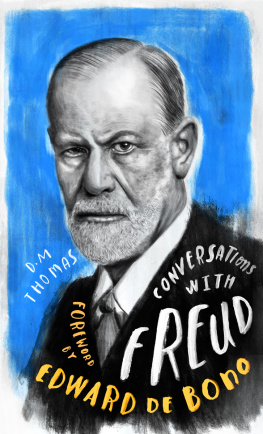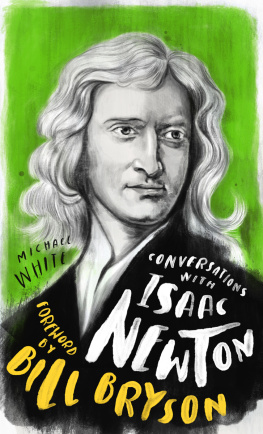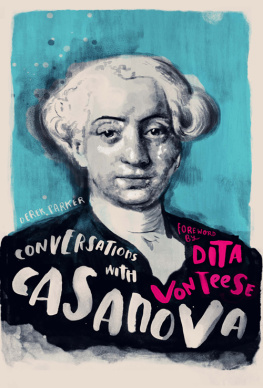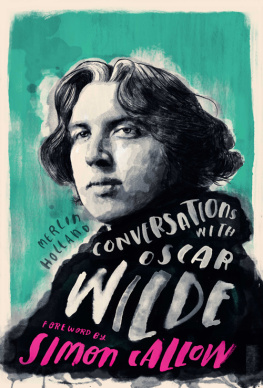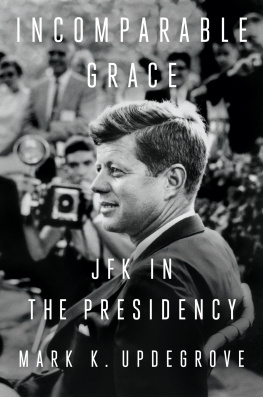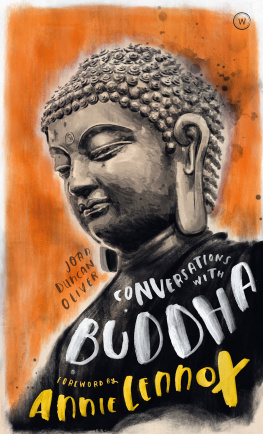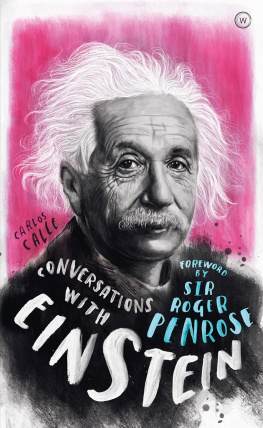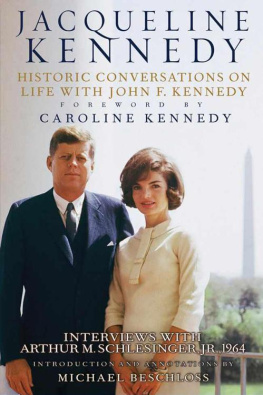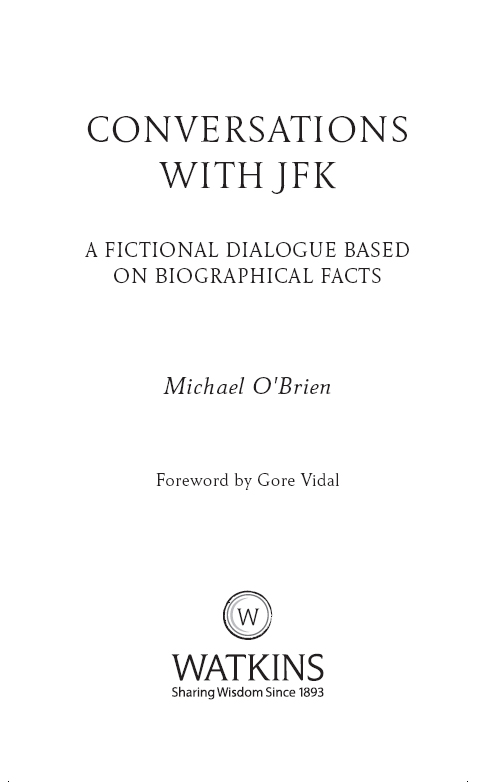CONVERSATIONS WITH JFK
Michael OBrien was Professor of History at the University of Wisconsin-Fox Valley until his retirement. He has written numerous books on 20th-century political history, including McCarthy and McCarthyism in Wisconsin (1981) and John F. Kennedy: A Biography (2005).
Gore Vidal was the author of 25 novels, six plays, many screen-plays, more than 200 essays, and the critically lauded memoir Palimpsest. Vidals United States: Essays 19521992 won the 1993 National Book Award. Upon his death in 2012 he was described by the LA Times as among the most elegant [writers] in the English language.
Learn about key figures in science, spirituality, art and literature through revealing dialogues based on established fact. Written by a fantastic collection of authors and foreword writers gathered together to delve into the lives and achievements of some of the worlds greatest historical figures, this series is perfect for anyone looking for a quick and accessible introduction to the subject.
OTHER TITLES IN THE SERIES
Published
Conversations with Oscar Wilde
by Merlin Holland; Foreword by Simon Callow
Conversations with Casanova
by Derek Parker; Foreword by Dita Von Teese
Forthcoming
Conversations with Buddha
by Joan Duncan Oliver; Foreword by Annie Lennox
Conversations with Dickens
by Paul Schlicke; Foreword by Peter Ackroyd
Conversations with Galileo
by William Shea; Foreword by Dava Sobel
This edition first published in the UK and USA 2019 by
Watkins, an imprint of Watkins Media Limited
Unit 11, Shepperton House
8993 Shepperton Road
London
N1 3DF
Design and typography copyright Watkins Media Limited 2019
Text copyright Michael OBrien 2019
Foreword copyright Gore Vidal 2019
Michael OBrien has asserted his right under the Copyright, Designs and Patents Act 1988 to be identified as the author of this work.
All rights reserved.
No part of this book may be reproduced or utilized in any form or by any means, electronic or mechanical, without prior permission in writing from the Publishers.
10 9 8 7 6 5 4 3 2 1
Typeset by JCS Publishing Services Ltd
Printed and bound by TJ International Ltd, Padstow, Cornwall
A CIP record for this book is available from the British Library
ISBN: 978-1-78678-228-1
www.watkinspublishing.com
FOREWORD BY GORE VIDAL
I became aware of Jack Kennedy when I was about ten years old and living part-time in Washingtons Rock Creek Park with my grandparents, Senator and Mrs Gore. Their yellow stone house atop a hill overlooked Rock Creek itself where salamanders lived and on whose banks I built elaborate sand castles. Otherwise, I sometimes lodged in the house of my mother and her second husband, Hugh D. Auchincloss, an heir to the Standard Oil fortune. Jacks father Joe, a banker and bootlegger during Prohibition, was a prominent, if sometimes disloyal, political ally of President Franklin D. Roosevelt. Around 1939, Life magazine ran a story that Joe Kennedy had set up for life each of his nine children with a million dollars apiece. When my father (President Roosevelts Director of Air Commerce) asked Joe whether or not he had done the wise thing by making his children so lavishly independent, Joe had replied, Well, anything is better than knowing that they are all waiting for you to die, a sensible answer, my father thought. Improvidently, he never had a million dollars to settle on me, but then, as my mother liked to complain, I had no respect for money and so could never do well in the cutthroat world of lobbyists and other gangsters that peopled Washington in the 1930s, almost as much as today.
My stepfather, Mr Auchincloss, had been Henry Luces roommate at Yale and helped finance Luces first publishing venture, Time, a magazine loyal to Luces friend Joe Kennedy. When Jack lost his PT boat in the Pacific during the war, Luce (Uncle Harry, as I was obliged to call him) pulled through magnificently for Jack, if not for me. After I got out of the army in 1946 I tried to get a job with Time and failed. It was said that I was on Times black list as a radical. Meanwhile, golden Jack was much praised by Luces publications, spectacularly so in 1957 when Jacks face appeared on the cover of Time. As we had become friends by then, I asked Jack how Joe had arranged that. He made a traditional gesture indicating that money had been spent. In general, Jack would be annoyed whenever anyone suggested that Joe had paid for his political career. Well, as Jack liked to joke back in 1946 when Joe had arranged a seat for him in the House of Representatives, its a lot better than a navy court martial for losing that PT 109, which he had feared. Jack did not care for the House of Representatives a can of worms, hed say.
In due course, post-war Jack married Jackie Bouvier who had replaced me as the stepchild of Mr Auchincloss and for years wore my nametaped shirts when riding horses. We all got to know each other through Jackie. Jack was not the dull rich boy he might have been. Jackie, who had intended to marry someone else, was finally persuaded that he was Mr Right. Like me she had no money. The fact that Jack had, by then, a ten-million-dollar trust fund, not to mention Old Joe back of him, was all-important to the young couple. Thus, she set foot, eyes open, on a fairly easy street. When her rejected New England WASP suitor wept and said, Whats going to become of you married to that mick? she told me that, vaingloriously, she had replied, Just read the newspapers. We all did. And so Camelot, beturreted, sprang fully armed from our native soil.
It was hardly a great love story. Each was highly practical. They were a couple out of 18th-century Europe, jointly taking over a republic that had not as yet found a civilization for itself. But post-war, that was to change. The dull agrarian republic would have not a rebirth but a birth in most of the civilized arts from music and poetry to ballet, with a glamorous young couple, as of 1961, at the center of a new Western civilization. True, she liked Cavafy and he preferred James Bond, but the presidential couple was at the head of a generational wave while dull old President Eisenhower slipped into the shadows.
Jacks powers of empathy were great and often curious, but the hero of World War II bored and irritated him. Mrs Eisenhower had a similar effect on Jackie who, the day before the Eisenhowers came to lunch, removed a portrait of Mamie from one of the state rooms where the former first lady had carefully placed it. When, around 1959, I asked Jack why Eisenhower irritated him he said, Well, for one reason, he calls me Kennedy as if I was a clueless junior officer. Jack took the Senate very seriously indeed and liked being a conscript father as the Romans called their senators. About the time Jack was stumbling at the Bay of Pigs in Cuba, he thought it wise to get Eisenhower aboard his triumphal chariot. Hes the only real conservative that Ive ever met. I suspect our elderly ex-president was awash in Schadenfreude to find the youngest, most charming of presidents up to his chin in disaster, eager to have him on his side in order to forestall conservative attacks. And it worked Eisenhower rallied round. Before he and Mamie came to lunch again, Jack went hunting for Mrs Eisenhowers banished portrait and moved it back to the spot she had chosen.
Unfortunately, Jack did not charm Khrushchev at their first meeting in Vienna, although back in Washington he was eager to talk about his first foray into high international politics. I was sitting on a stiff-backed chair next to his wheelchair in the White House secondfloor, west-facing sitting room. On my lap was a cheap metal box. Jack had set this box on my lap, announcing, Isnt this the cheesiest gift one chief of state ever gave another? I agreed and then asked, What did you give him? A beautiful ships model, said Jack and looked sad. Apparently, the Soviet leader had been reasonably amiable, at first. He even told Jack, I did not say, as your press reported, that there was no real difference between you and Nixon. Im glad, said Jack. I think there is a lot of difference. Things deteriorated when Jack decided, fatally, in my view, to point out the vast differences between himself and Nixon. He told the Russian that the greatest difference was that the entire American labour movement was for him and not for Nixon. Khrushchev laughed and said, We shot all of them in 1917. Jack was shocked and no doubt showed it. And that was pretty much the end of the famous walk in the Wiener Wald.
Next page
